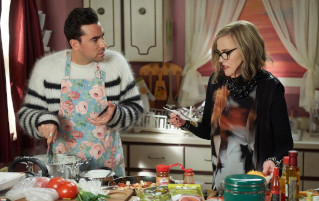As 'Schitt's Creek' Ends, Let's Appreciate Some Canadian Comedy, Eh?

One of the best shows in television these past six years has been Schitt's Creek. The premise starts off with a bit of an Arrested Development-esque riches-to-rags prompt, where the Rose family (who made their fortune in video rental franchises and starring in a soap opera) has lost all their money and assets after having it stolen by their business manager. Their lone asset is a small town they own called Schitt's Creek (the mayor is a guy named Roland Schitt), and it's the only place they can move. It's a dumb-yet-delightful joke to start off the series.
Sadly, Schitt's Creek is ending next week, but it's always good when a show can go out on its own terms. What made it great is that, while it starts from a similar place to Arrested Development, it doesn't take long before it goes in completely the opposite direction. Visits from the Roses' former life are few and far between, and the show thrives on niceness in a way that a show about rich people might otherwise not. It's a trite trope to be like "oh, all Canadians are just really nice," but that niceness is a staple component of Canadian comedy that dates back decades and makes these shows something you can truly love.
First, there's the very idealized small town. Schitt's Creek, Letterkenny, and Trailer Park Boys all have it. But what makes these small Canadian town settings different from an American version is that there aren't these sorts of built-in expectations of racism, homophobia, and a distrust of foreigners that might exist out in the sticks in Georgia. Dan Levy, who plays David on Schitt's Creek, has talked specifically about how the show wanted to avoid small-town homophobia when they gave David a boyfriend. Letterkenny, time and time again, says the line, "If a man asks for help, you help him." It's a line that applies to even some of the most unlikeable-by-design characters in the show.
There's also an unbelievable amount of ingenuity baked into these small towns. While it's tempting to see small-town folk as simpletons, these rural Canadian comedies do just the opposite. They give their characters credit rather than trying to compromise them, or derive humor from making them look horrid. The stories are better for it when the creativity comes out. The folks of Letterkenny regularly find unique solutions to their problems and have lightning-fast verbal spars, whether it's a quick alliterative literal cold open about winter ...
... or debating how an ant could ride a Sea-doo.
It's creativity born from environmental limitations, and it works perfectly.
However, the granddaddy of all of this is Red Green. If you haven't heard of him, we implore you to check out a couple of Handyman Corner clips. In general, Red takes something cool, realizes it's probably out of his price range, and puts his own spin on it -- for example, all-wheel steering or a mid-engine car.
The thing that binds these all together, is that they're all taking a certain amount of pride in their small-town origins without getting super arrogant or comparing it to other places. It's just home. In Schitt's Creek, David is the character perhaps most likely at the beginning to find a way to jump ship. But by the end, he's done a total 180 and seems the most likely to stay in town. It's a certain type of pride that's uniquely Canadian, it works remarkably well for these TV shows.
So while it might have been easy and funny to root for chaos, in a series like Arrested Development, taking place in a wealthy part of southern California, it's a more mentally and emotionally invested humor coming out of rural Canada that holds on to you longer. And that's what I appreciates about them.
Isaac is on Twitter and Instagram @NotFunnyIsaac. He has never been to Canada.
Top Image: ITV Studios